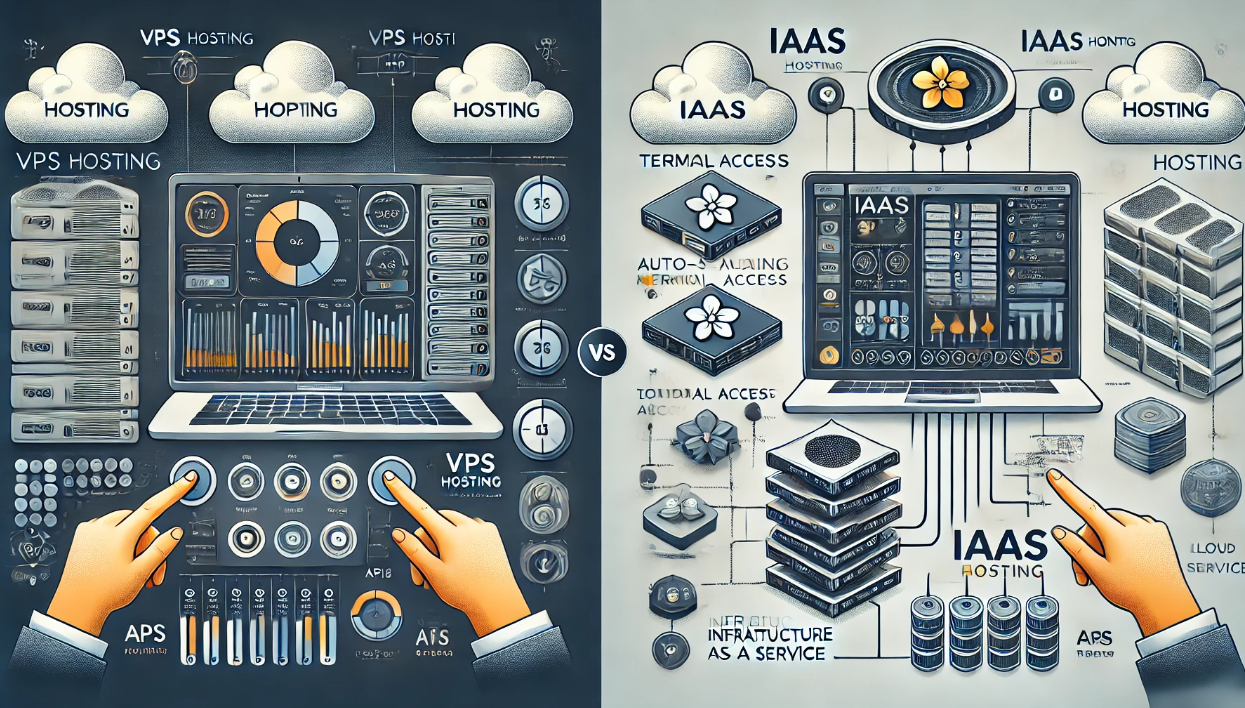IaaS vs VPS Hosting: When to Choose One Over the Other
Meta Description: Confused between VPS and IaaS? This guide compares performance, control, automation, and use cases to help you decide which infrastructure is right for your project or business.
Introduction: VPS or IaaS — What’s Best for You?
Choosing the right hosting model isn’t just about price or specs — it’s about aligning infrastructure with your goals.
On one side, you have the familiar VPS (Virtual Private Server) — a cost-effective, easy-to-manage server environment. On the other, you’ve got IaaS (Infrastructure as a Service) — flexible, scalable, cloud-native resources tailored for larger-scale infrastructure needs.
So… when do you choose one over the other?
Let’s break it down — side-by-side.
⚙️ Quick Definitions
VPS (Virtual Private Server):
A virtual machine running on a physical server. You get fixed resources (RAM, CPU, disk) and root access in a semi-isolated environment. Think of it as a slice of a dedicated server.
IaaS (Infrastructure as a Service):
A fully abstracted cloud platform offering compute, networking, and storage resources on-demand — like AWS EC2, Microsoft Azure, or Google Cloud Compute Engine.
IaaS vs VPS: Feature-by-Feature Comparison
| Feature | VPS Hosting | IaaS Cloud Hosting |
|---|---|---|
| Performance | Fixed resources (scalable manually) | Dynamic scaling, auto-adjust based on load |
| Control | Root access to OS | Root + full control over network/storage |
| Automation | Limited (manual setup/config) | Extensive automation via APIs, Terraform |
| Networking | Basic IP + port management | Advanced VPC, firewalls, load balancers |
| Backups | Manual or scheduled via host panel | Snapshot, volume backups, image cloning |
| Scalability | Vertical scaling (upgrade VPS plan) | Vertical + horizontal (auto-scale groups) |
| Cost Structure | Flat monthly pricing | Pay-as-you-go, metered by usage |
| Use Case | Small business, blog, store, portfolio | SaaS, DevOps, multi-app systems, big data |
Performance: Consistency vs Dynamic Scaling
-
VPS Performance:
You’re allocated fixed CPU, RAM, and disk resources. Great for predictable workloads. However, you may hit limits during traffic surges unless you manually upgrade. -
IaaS Performance:
Built for elasticity. You can spin up or destroy virtual machines on the fly, scale horizontally with load balancers, and optimize for burst traffic.
Choose VPS if:
You want consistent performance at a predictable cost.
Choose IaaS if:
You need elastic compute power, especially during traffic spikes or for distributed apps.
Control Level: Root Access vs Total Environment Control
-
VPS:
You control the OS and server stack, but the underlying hardware and virtualization layer are managed by the provider. -
IaaS:
You control the virtual machine, storage volumes, network configuration (VPCs, subnets, NAT), and even firewall behavior. It’s full stack control, minus physical hardware.
Choose VPS if:
You need OS-level control but don’t want to deal with complex infrastructure.
Choose IaaS if:
You want to design your own architecture — from network layers to instance types.
Automation Capabilities: Manual vs Cloud-Native DevOps
-
VPS:
Setup is usually manual via a control panel (cPanel, Plesk) or CLI. Some providers offer limited scripting or API control. -
IaaS:
Built for DevOps and automation:-
Use Terraform to provision infrastructure as code
-
Trigger actions with webhooks or cron jobs
-
Integrate with CI/CD pipelines for deployment
-
Choose VPS if:
You want simplicity and don’t need continuous automation.
Choose IaaS if:
Your stack includes CI/CD, container orchestration, or complex deployment flows.
Use Cases for VPS Hosting
VPS is ideal for:
-
Small to medium-sized websites (blogs, business sites)
-
eCommerce stores running WooCommerce or Magento
-
Freelancers and agencies managing multiple sites
-
Developers needing a sandbox environment
-
Game servers, VPNs, and lightweight app hosting
Pros:
-
Affordable
-
Easier to manage
-
Full root access
-
Predictable cost
Use Cases for IaaS
IaaS fits best when you need:
-
Highly scalable applications
-
SaaS platforms or multi-user web apps
-
DevOps workflows with CI/CD automation
-
Big data processing or AI/ML workloads
-
Multi-region availability
-
Custom networking or hybrid cloud environments
Popular IaaS Platforms:
-
Amazon Web Services (AWS)
-
Google Cloud Platform (GCP)
-
Microsoft Azure
-
DigitalOcean Droplets with custom infrastructure
-
Linode Cloud Manager (for advanced use)
Final Thoughts: Which Should You Choose?
| You Should Choose… | If You… |
|---|---|
| VPS Hosting | Want affordable, easy-to-manage hosting with full OS access |
| IaaS Hosting | Need cloud-native, automated infrastructure with flexible scaling |
Still unsure? Start with VPS for simple needs — and grow into IaaS when automation, scale, or DevOps workflows become essential.

